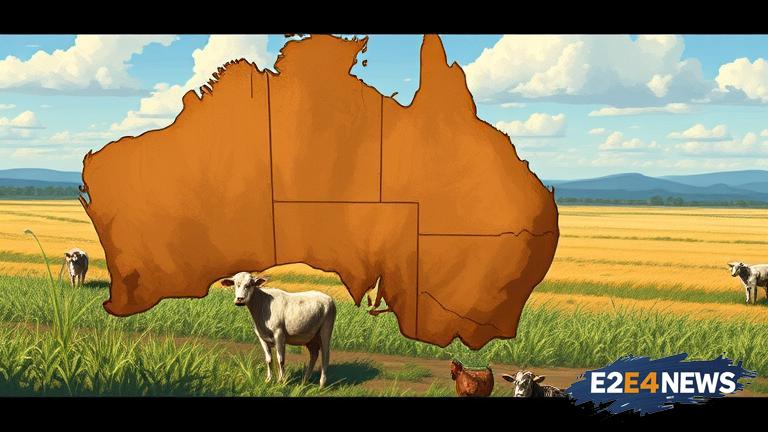Australia’s agricultural sector is on the cusp of a significant transformation, driven by the need to increase food production to meet the demands of a growing global population. By 2050, the world will require 70% more food, and Australia is well-positioned to play a major role in meeting this demand. The country’s agricultural industry is expected to undergo significant changes, driven by advances in technology, sustainable practices, and innovative farming methods. One of the key drivers of this transformation will be the adoption of precision agriculture, which uses advanced technologies such as drones, satellite imaging, and data analytics to optimize crop yields and reduce waste. Australian farmers are also embracing sustainable practices, such as regenerative agriculture, which prioritizes soil health, biodiversity, and ecosystem services. This approach not only improves the environmental sustainability of farming but also enhances the quality and nutritional value of produce. Furthermore, Australia’s agricultural sector is expected to benefit from the growing demand for high-quality, premium food products, particularly in Asia. The country’s proximity to key markets, combined with its reputation for producing clean, green, and safe food, makes it an attractive supplier of agricultural products. The Australian government has also launched several initiatives to support the growth of the agricultural sector, including the development of a national agricultural strategy and the establishment of a new agricultural research and development corporation. Additionally, there are plans to invest in rural infrastructure, including roads, rail, and water storage, to improve the efficiency and productivity of the sector. The use of renewable energy, such as solar and wind power, is also expected to play a significant role in reducing the carbon footprint of Australian agriculture. Moreover, the sector is likely to benefit from the growing trend towards vertical farming, which involves growing crops in vertically stacked layers, often in indoor environments. This method of farming can increase yields while minimizing land use and reducing water consumption. Australian farmers are also exploring the potential of alternative proteins, such as plant-based meats and insect-based foods, which are expected to become increasingly popular in the coming years. The development of new technologies, such as blockchain and artificial intelligence, is also expected to play a key role in transforming the agricultural sector. These technologies can help to improve supply chain efficiency, reduce food waste, and enhance the transparency and accountability of the sector. Overall, Australia’s agricultural sector is poised for significant growth and transformation in the coming years, driven by a combination of innovative technologies, sustainable practices, and growing demand for high-quality food products. As the global population continues to grow, Australia is well-positioned to play a major role in meeting the world’s food needs, while also promoting sustainable agriculture and reducing its environmental impact. The country’s agricultural industry is expected to create new opportunities for farmers, rural communities, and the broader economy, while also contributing to the development of a more sustainable and food-secure future. With its strong reputation for producing high-quality food, combined with its innovative spirit and commitment to sustainability, Australia is ready to take center stage on the global agricultural stage by 2050. The future of Australian agriculture looks bright, with a growing focus on sustainability, innovation, and export-driven growth. As the sector continues to evolve, it is likely to create new opportunities for investment, job creation, and economic growth, while also promoting a more sustainable and food-secure future for generations to come.
